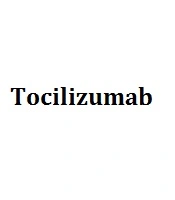Dear Editor,
The outbreak of Corona Virus Disease-19 (COVID-19) in Wuhan, China caused by severe acute respiratory syndrome coronavirus 2 (SARS-CoV-2) was declared a ‘pandemic disease’ by the World Health Organization (WHO), and the application of tocilizumab in the down regulation of interleukin-6 (IL-6), a potential disease worsening factor, was hypothesized in a published article by Zhang and colleagues (1), and tocilizumab has introduced as a promising treatment option for COVID-19.
Acute respiratory distress syndrome (ARDS) is a leading cause of high mortality rate in patients with COVID-19 worldwide, and SARS-CoV-2-mediated release of high level of large number of pro-inflammatory cytokines, including IL-6 and tumour necrosis factor-α (TNF-α), which is mostly responsible for commencing a massive systemic inflammatory response, also known as ‘cytokine storm’ leading to acute respiratory failure, as mentioned in a article by Mehta and colleagues (2). In response to the interaction between SARS-CoV-2 and host cell, IL-6 binds with soluble IL-6 receptor (IL-6R) on the cell membrane and activates the IL-6R-mediated signal transduction pathway that precedes the pro-inflammatory responses of IL-6. Tocilizumab, an approved drug for rheumatoid arthritis, is a monoclonal antibody that specifically binds with interleukin-6 receptor, and inhibits the pro-inflammatory roles of IL-6 by preventing the interaction between IL-6 and IL-6R (1, 2). The off-label use of tocilizumab (400 mg once, intravenously) in 21 patients with severe COVID-19 mentioned in a study by Xu and colleagues (3) in China revealed a significant improvement in severity of disease, and 90.5% of patients discharged to home, successfully. Though limited experience to till date, associated clinical outcomes with tocilizumab in COVID-19 encourage its use concomitantly to tackle this severe infection, efficiently.
Tocilizumab is available in the name of ‘Actemra’ (trade name) by Roche Pharma (Switzerland) Ltd., worldwide, and this product was used for the inflammation management in patients with severe COVID-19 in the above mentioned study (3). The Food and Drug Administration (FDA) of the United States approved tocilizumab as a potential drug for the treatment of rheumatoid arthritis, but it has been considered as a costly medicine as mentioned in a study (4), because of its high price. However, in low- and middle-income countries (LMICs), 50% - 90% of the population pays their treatment-cost from their own pocket (5). Many peoples of LMICs have been affected by SARS-CoV-2 (2, 3), and tocilizumab may be a drug of choice for many physicians to incorporate early in the treatment of severe COVID-19 in patients who financially may not be capable of bearing the cost of the treatment with tocilizumab (actemra), leading to an overburdened cost-of-treatment. Actemra (tocilizumab) is an innovator product; and the price of innovator products are 257%, 175%, 135%, 90%, 40% and 34% higher than the generic products in Malawi, Sri Lanka, Brazil, Pakistan, Nepal and Bangladesh, respectively (5). Tocilizumab has no alternate generic in the world market, and use of actemra or other costly medications in patients with COVID-19 may ultimately cause huge financial-burden on community peoples living under/near the poverty-threshold in LMICs.
More clinical evidences on the use of tocilizumab in the treatment of severe COVID-19 may be supportive for using this costly medicine in patients with COVID-19 in LMICs, considering the current global pandemic situation. At this serious pandemic condition, where no specific drug has yet been recommended by the WHO for the treatment of COVID-19 worldwide, alternative cost-effective medications with proven efficacy are highly encouraging to use in COVID-19 treatment in patients living under-poverty margin in LMICs. As of suggestion, financial supports from the respective governments, subsidized prices of the innovators products, and the development of hospital-based cost-effective therapeutic guidelines considering the country’s economic status may be effective at this pandemic situation to continue the treatment of COVID-19 until new officially approved drug comes-up in the global market.
